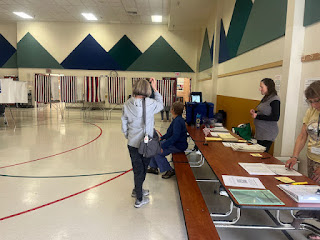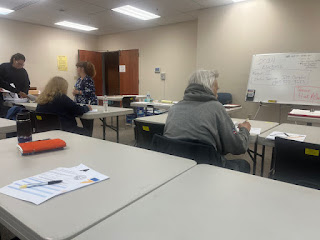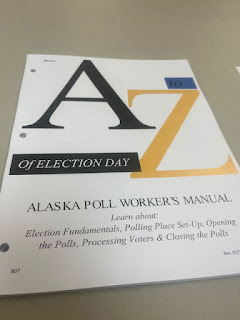The only thing I know for certain, the current mayor needs to be retired. He was the surprise winner last time in a runoff. He was a candidate because of the pandemic and homelessness. He was backed by those who opposed masks and the decisions to quarantine in Alaska and Anchorage. A key group supporting him live in Geneva Woods, a neighborhood of large houses in mid-town, where his supporters were strongly opposed to the Municipality buying a Best Western Hotel that had seen better days and turning it into a shelter for the homeless. Easy walking distance to their snooty neighborhood and that was unacceptable.
His supporters have disrupted Assembly meetings, yelled epithets are LGBTQ and Jewish Assembly members, wore yellow stars and compared the restrictions due to COVID to be like the Holocaust (which they normally would deny even happened.)
Many of his appointees have long gone. One of his former City Managers is suing the city for about three quarters of a million dollars, His approach to homeless folks was a mass shelter in a giant tent. I'm still fairly certain that if we track down why he wanted to buy that tent, we'd find some sort of financial or political connection. Snow removal has been a disaster.
So, the mayor is not on my list.
Suzanne LaFrance was on the Assembly for much of the Mayor's tenure, chair part of that time. She early on announced she was running for Mayor. This is a non-partisan race and I'm not sure if she is even registered as one part or another. She's done a reasonably good job and certainly knows the details of what's gone on in Anchorage. I even interviewed for six or seven years ago when she was a first time candidate running for the Assembly. She was pretty raw, but dedicated. She's learned a lot over the years.
But then Chris Tuck announced he was running. Tuck is a Democrat who has been on the Anchorage School Board, but then spent more time in Juneau as a representative - including stints as minority and majority leader. I met him when I blogged the legislature in 2010 and he's a very personable guy and has a reputation of being able to work out compromises across party lines. He's got strong labor connections, yet LaFrance has garnered a lot of union support. I was told he voted for legislation that labor opposed (or vice versa) but I have no details.
Tuck's entry into the race threw the liberal challenge against the incumbent mayor into confusion. Both were good candidates. LaFrance supporters started pointing out that Tuck was anti-abortion. He's never denied that, but he's also said he votes for what his constituents want, and to my knowledge, as a politician has gone along with the other Democrats on abortion issues.
Then Bill Popp joined the race. Popp has been head of the Economic Development Council for many years and says he's never registered in either party. Before Trump hijacked the Republican party, Popp's interest in business and economics would have aligned him with more traditional Republicans, at least with the Chamber of Commerce, though I do not know his stance on social issues. He has good knowledge of Anchorage.
This race requires a candidate to get at least 45% to win. The sense I get is that those who follow politics closely don't expect any of the candidates to reach that number.
The question then is who will be in the runoff. An article in the Anchorage Daily News today says the candidates suspect that Mayor Bronson will face one of the above three in a runoff.
So, who to vote for? I think LaFrance and Tuck would both make good mayors. They're both level headed and decent people. I suspect the same could be said for Popp, but I don't know him really, and my perception of him as part of the Chamber of Commerce crowd takes him out of my top two. (Lots of people join the Chamber of Commerce, not because they are politically aligned with their fairly conservative business view of the world, but because that's where many of the key players gather weekly. My uninformed sense is Popp probably fits in with the Chamber crowd comfortably.)
So, LaFrance or Tuck?
I was happy when LaFrance announced her candidacy. I was thrown into a conundrum when Tuck announced his interest in the race. LaFrance seemed to be more intimately knowledgeable of City dealings because of her position on the Assembly and dealing with all the issues for the last six years from there.
Tuck seemed like an interloper, though he represents Anchorage and is an astute politician who has paid close attention to the city in which his district lies. I'd note that when Elvi Gray Jackson announced her US Senate run in 2022, Tuck announced he would run for her Alaska State Senate seat. That avoided a run against fellow Anchorage legislator Andy Josephson. Both had been redistricted into the same district. But when Gray-Jackson saw what was developing in the US Senate race, she pulled out and signed back on to run for her State Senate seat. At this point, Tuck pulled out altogether - choosing not to run against either fellow Democrat. I think that reflects positively on his moral compass and willingness to support his fellow Democratic legislators.
It also suggests to me that he didn't make the decision to run against LaFrance for mayor lightly.
As I watched the lists of people signing up to support LaFrance or Tuck, it appeared to me that people who knew LaFrance the Assembly member, supported her. Those who knew Tuck from his rule in the State legislature supported him.
I think they'd both do a good job. My biggest concern is that they'll cancel each other out and Popp ends up in a runoff with Bronson. And, again, I think Popp will be a competent mayor, but not necessarily someone aligned with a forward looking stance. (By that I mean, someone who recognizes that Climate Change is the biggest challenge facing humanity and business has been a prime supporter of policies that have brought us to this climate crisis.)
I've picked one of the two. My absentee ballot is still in the house. I've got some time yet before I have to turn it in. I'm on pause just in case something happens to sway me toward the other candidate. I'm not expecting anything to change, but just in case.
The only conclusion I have come to firmly is that Anchorage should switch to Ranked Choice Voting. Then folks can vote for the first and second (etc.) choices.
































